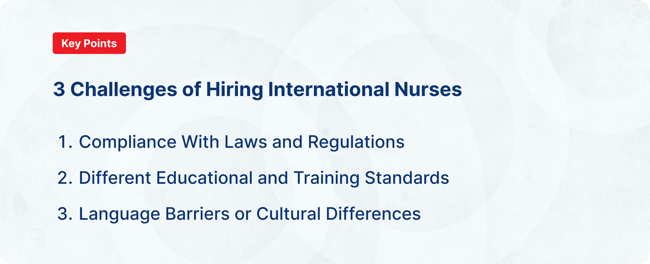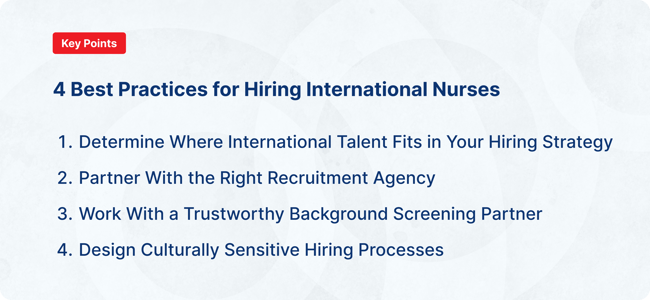
.jpg?height=200&name=BLOG_%20Nursing%20Background%20Check%20Requirements_%20What%20You%20Need%20to%20Know%20(Refreshed).jpg)
Ensuring quality patient care requires you to maintain knowledge of and compliance with your...

The nursing shortage is a critical issue affecting healthcare systems worldwide, and the United States is no exception. Hospitals and healthcare facilities across the country are struggling to fill nursing positions, which affects patient care and healthcare delivery. To address this challenge, many U.S. hospitals are hiring international nurses.
Hiring nurses from other countries can provide much-needed support to the healthcare workforce during staffing shortages. However, there are unique considerations to account for when recruiting and hiring international nurses.
Explore the benefits and challenges of hiring international nurses in the USA, as well as best practices for doing so at your healthcare facility.
Key takeaways:
|
The U.S. is grappling with a critical nursing shortage that threatens the healthcare system at its core.
Every year through 2032, the U.S. will lose 15,700 more nurses than it adds. The U.S. anticipates an additional 177,400 nurses entering the workforce from 2022 to 2032. But that wouldn’t even fill one year of projected job openings for registered nurses (RNs) over that span. This shortfall underscores the gravity of the nursing shortage and portends further challenges for the healthcare industry.
In 2021, the U.S. lost more than 100,000 RNs — the steepest decline seen in the past four decades. Evidence points to the COVID-19 pandemic intensifying the shortage, with many leaving the their nursing career due to burnout and stress. The data shows a significant drop in nurses between the ages of 35-49, suggesting that the decline isn’t driven by nurses aging out or retiring.
This exodus has left healthcare facilities understaffed, impacting patient care, healthcare delivery, and the resilience of the healthcare ecosystem.

International nurses bring numerous benefits to U.S. hospitals. They can provide high-quality care, fill staffing gaps, and give healthcare facilities access to a broader pool of skilled and experienced professionals.
Hiring of international nurses has increased steadily in recent years. In 2018, foreign-born healthcare workers accounted for 18% of the U.S. healthcare workforce, and more than 30% in some states. The vast majority (94%) of international nurses seeking U.S.-based employment are RNs, with a majority having 11-plus years of nursing experience.
Furthermore, international healthcare professionals bring a diverse set of skills and knowledge. They may have specialized training or experience in different areas of nursing, such as critical care, pediatrics, or geriatrics. This improves overall quality of patient care and can increase the range of services available.

Hiring international nurses comes with challenges that require careful navigation and additional support to ensure a smooth transition and successful integration.
One of the biggest challenges for healthcare HR leaders is understanding and complying with laws and regulations related to hiring international nurses. These can include immigration laws, labor laws, and healthcare regulations, all of which can vary from country to country.
As you research laws and regulations that apply to hiring international nurses in your country, consult with legal experts who specialize in international employment.
Obtaining a work visa for international nurses can be a lengthy and complex process, especially for healthcare HR leaders who need to fill positions quickly and efficiently. HR leaders should consult with immigration lawyers and visa-processing agencies to make the visa process faster and compliant. Plan ahead, and start the visa process early to avoid delays.
Obtaining and verifying required licenses and credentials for international nurses can be complex and time-consuming. Licensing and credentialing requirements can vary across countries.
Employers may need to help international nurses in navigating the process, which can include submitting documentation, making translations, and other forms of support. This work often requires collaboration with regulatory bodies and healthcare organizations in both the home and host countries.
One significant hurdle is the potential for cultural, linguistic, and communication barriers. Many international nurses don’t speak English as a primary language, requiring U.S.-based employers to help them improve their English-language skills. Employers can facilitate this with English language training programs and other resources.
Cultural orientation programs play a crucial role in acquainting international nurses with the cultural nuances and expectations of the host country. Offering these resources helps nurses acclimate into the workplace and deliver culturally sensitive patient care.

Bringing international nurses into your healthcare team can be a rewarding and enriching experience. To ensure a successful hiring process, here are some key considerations.
Before hiring international nurses, analyze your current staffing needs, skill gaps, and language requirements. The goal is to identify the roles that international nurses can best fill. A targeted approach helps optimize your resources while only hiring nurses who align with your facility's requirements.
Partnering with specialty service providers can streamline the hiring process. These providers specialize in international nurse recruitment and can assist with identifying qualified candidates, managing visa applications, and providing cultural orientation programs. Their expertise can save you time, reduce administrative burdens, improve compliance, and create a smooth and efficient hiring process.
Conducting background checks can uncover red flags or discrepancies in an international nurse's credentials, work experience, and education. Background checks are essential for employers that want to screen out unqualified or fraudulent candidates, and they help protect the organization's reputation and the safety of patients and staff.
Identify partners with a proven track record of success and access to international databases. These companies are prepared to conduct comprehensive nurse background checks on international candidates. By finding a reputable background screening company, you can streamline the hiring process by avoiding delays and errors in verifying a candidate's work history and credentials.
Creating culturally sensitive hiring processes is essential for fostering an inclusive and welcoming workplace. Provide training to hiring managers and staff on cultural diversity, unconscious bias, and effective communication strategies. Implement standardized hiring procedures that evaluate candidates based on their skills, qualifications, and abilities, rather than subjective criteria. By embracing cultural sensitivity, you’re more likely to attract and retain top international nursing talent.
Hiring international nurses can be daunting and time-consuming, but with Cisive's background screening software, employers can streamline the process while hiring the highest-quality candidates.
By using Cisive’s background screening software, healthcare facilities can save time, reduce costs, and mitigate potential risks. Embrace this innovative tool for a more efficient and successful recruitment process that ultimately benefits employers, employees, and patients.
Want to learn more? Schedule a call with one of our background screening experts.
Author: Cisive Staff
Bio: Contributed by a member of our staff with expertise in background screening for highly regulated industries.
Let's Connect on LinkedIn.jpg?height=200&name=BLOG_%20Nursing%20Background%20Check%20Requirements_%20What%20You%20Need%20to%20Know%20(Refreshed).jpg)
Ensuring quality patient care requires you to maintain knowledge of and compliance with your...

Travel nurses provide much-needed flexibility and expertise to healthcare teams. However, the...

The U.S. is on track to face a shortfall of more than 78,000 full-time nurses by 2025, according to...